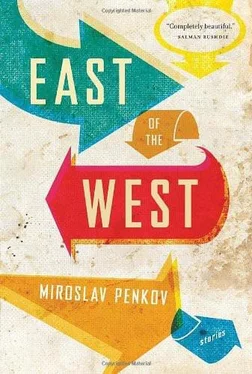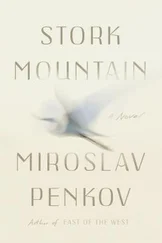But Vera and I saw each other often, sometimes twice a month. I never found the courage to speak of the soldier. At night, we swam to the drowned church and played around the cross, very quiet, like river rats. And there, by the cross we kissed our first real kiss. Was it joy I felt? Or was it sadness? To hold her so close and taste her breath, her lips, to slide a finger down her neck, her shoulder, down her back. To lay my palm upon her breasts and know that someone else had done this, with force, while I had watched, tongue swallowed. Her face was silver with moonlight, her hair dripped dark with dark water.
“Do you love me?” she said.
“Yes. Very much,” I said. I said, “I wish we never had to leave the water.”
“You fool,” she said, and kissed me again. “People can’t live in rivers.”
•
That June, two months before the new sbor , our parents found out about Boban. One evening, when I came home for supper, I discovered the whole family quiet in the yard, under the trellis. The village priest was there. The village doctor. Elitsa was weeping, her face flaming red. The priest made her kiss an iron cross and sprinkled her with holy water from an enormous copper. The doctor buckled his bag and glass rattled inside when he picked it up. He winked at me and made for the gate. On his way out, the priest gave my forehead a thrashing with the boxwood foliage.
“What’s the matter?” I said, dripping holy water.
Grandpa shook his head. Mother put her hand on my sister’s. “You’ve had your cry,” she said.
“Father,” I said, “why was the doctor winking? And why did the priest bring such a large copper?”
Father looked at me, furious. “Because your sister, Nose,” he said, “requires an Olympic pool to cleanse her.”
“Meaning?” I said.
“Meaning,” he said, “your sister is pregnant. Meaning,” he said, “we’ll have to get her married.”
•
My family, all dressed up, went to the river. On the other bank Boban’s family already waited for us. Mother had washed the collar of my shirt with sugar water so it would stay stiff, and now I felt like that sugar was running down my back in a sweaty, syrupy stream. It itched and I tried to scratch it, but Grandpa told me to quit fidgeting and act like a man. My back got itchier.
From the other side, Boban’s father shouted at us, “We want your daughter’s hand!”
Father took out a flask and drank rakia , then passed it around. The drink tasted bad and set my throat on fire. I coughed and Grandpa smacked my back and shook his head. Father took the flask from me and spilled some liquor on the ground for the departed. The family on the other side did the same.
“I give you my daughter’s hand!” Father yelled. “We’ll wed them at the sbor.”
Elitsa’s wedding was going to be the culmination of the sbor , so everyone prepared. Vera told me that with special permission Mihalaky had transported seven calves across the river, and two had already been slain for jerky. The two of us met often, secretly, by the drowned church.
One evening, after dinner, my family gathered under the trellised vine. The grown-ups smoked and talked of the wedding. My sister and I listened and smiled at each other every time our eyes met.
“Elitsa,” Grandma said, and lay a thick bundle on the table. “This is yours now.”
My sister untied the bundle and her eyes teared up when she recognized Grandma’s best costume readied for the wedding. They lay each part of the dress on its own: the white hemp shirt, the motley apron, the linen gown, festoons of coins, the intricately worked silver earrings. Elitsa lifted the gown, and felt the linen between her fingers, and then began to put it on.
“My God, child,” Mother said, “take your jeans off.”
Without shame, for we are all blood, Elitsa folded her jeans aside and carefully slipped inside the glowing gown. Mother helped her with the shirt. Grandpa strapped on the apron, and Father, with his fingers shaking, gently put on her ears the silver earrings.
•
I woke up in the middle of the night, because I’d heard a dog howl in my sleep. I turned the lights on and sat up, sweaty in the silence. I went to the kitchen to get a drink of water and I saw Elitsa, ready to sneak out.
“What are you doing?” I said.
“Quiet, dechko . I’ll be back in no time.”
“Are you going out to see him?”
“I want to show him these.” She dangled the earrings in her hand.
“And if they catch you?”
She put a finger to her lips, then spun on her heel. Her jeans rasped softly and she sank into the dark. I was this close to waking up Father, but how can you judge others when love is involved? I trusted she knew what she was doing.
For a very long time I could not fall asleep, remembering the howling dog in my dream. And then from the river, a machine gun rattled. The guard dogs started barking and the village dogs answered. I lay in bed petrified, and did not move even when someone banged on the gates.
My sister never used to swim to the Serbian side. Boban always came to meet her on our bank. But that night, strangely, they had decided to meet in Srbsko one last time before the wedding. A soldier in training had seen her climb out of the river. He’d told them both to stop. Two bullets had gone through Elitsa’s back as she tried to run.
•
This moment in my life I do not want to remember again:
Mihalaky in smoke and roar is coming up the river, and on his boat lies my sister.
•
There was no sbor that year. There were, instead, two funerals. We dressed Elitsa in her wedding costume and lay her beautiful body in a terrible coffin. The silver earrings were not beside her.
The village gathered on our side of the river. On the other side was the other village, burying their boy. I could see the grave they had dug, and the earth was the same, and the depth was the same.
There were three priests on our side, because Grandma would not accept any Communist godlessness. Each of us held a candle, and the people across from us also held candles, and the banks came alive with fire, two hands of fire that could not come together. Between those hands was the river.
The first priest began to sing, and both sides listened. My eyes were on Elitsa. I couldn’t let her go and things misted in my head.
“One generation passes away,” I thought the priest was singing, “and another comes; but the earth remains forever. The sun rises and the sun goes down, and hastens to the place where it rises. The wind goes toward the West, toward Serbia, and all the rivers run away, East of the West. What has been is what will be, and what has been done is what will be done. Nothing is new under the sun.”
The voice of the priest died down, and then a priest on the other side sang. The words piled on my heart like stones and I thought how much I wanted to be like the river, which had no memory, and how little like the earth, which could never forget.
•
Mother quit the factory and locked herself home. She said her hands burned with her daughter’s blood. Father began to frequent the cooperative distillery at the end of the village. At first he claimed that assisting people with loading their plums, peaches, grapes into the cauldrons kept his mind blank; then that he was simply sampling the first rakia which trickled out the spout, so he could advise the folk how to boil better drink.
He lost both his jobs soon, and so it was up to me to feed the family. I started working in the coal mine, because the money was good, and because I wanted, with my pick, to gut the land we walked on.
The control across the borders tightened. Both countries put nets along the banks and blocked buffer zones at the narrow waist of the river where the villagers used to call to one another. The sbor s were canceled. Vera and I no longer met, though we found two small hills we could sort of see each other from, like dots in the distance. But these hills were too far away and we did not go there often.
Читать дальше











